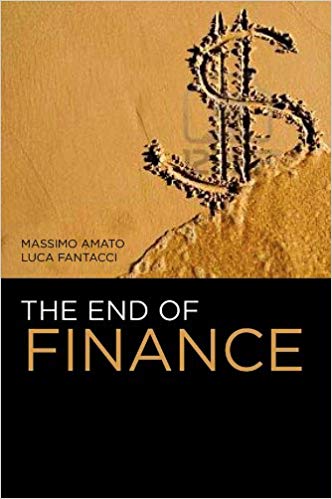This new book by two distinguished Italian economists is a highly original contribution to our understanding of the origins and aftermath of the financial crisis. The authors show that the recent financial crisis cannot be understood simply as a malfunctioning in the subprime mortgage market: rather, it is rooted in a much more fundamental transformation, taking place over an extended time period, in the very nature of finance.
The ‘end’ or purpose of finance is to be found in the social institutions by which the making and acceptance of promises of payment are made possible - that is, the creation and cancellation of debt contracts within a specified time frame. Amato and Fantacci argue that developments in the modern financial system by which debts are securitized has endangered this fundamental credit/debt structure. The illusion has been created that debts are universally liquid in the sense that they need not be redeemed but can be continually sold on in increasingly extensive global markets. What appears to have reduced the riskiness of default for individual agents has in fact increased the fragility of the system as a whole.
The authors trace the origins of this profound transformation backwards in time, not just to the neoliberal reforms of the 1980s and 90s but to the birth of capitalist finance in the mercantile networks of the sixteenth and seventeenth centuries. This long historical perspective and deep analysis of the nature of finance enables the authors to tackle the challenges we face today in a fresh way - not simply by tinkering with existing mechanisms, but rather by asking the more profound question of how institutions might be devised in which finance could fulfil its essential functions.
چکیده فارسی
این کتاب جدید توسط دو اقتصاددان برجسته ایتالیایی کمکی بسیار بدیع به درک ما از منشاء و پیامدهای بحران مالی است. نویسندگان نشان میدهند که بحران مالی اخیر را نمیتوان صرفاً بهعنوان یک نقص در بازار وامهای ارزان قیمت درک کرد: بلکه ریشه در دگرگونی بسیار اساسیتری دارد که در یک دوره زمانی طولانی در ماهیت مالی رخ میدهد.
«پایان» یا هدف تأمین مالی را باید در نهادهای اجتماعی یافت که به وسیله آنها امکان دادن و پذیرش وعده های پرداخت امکان پذیر می شود - یعنی ایجاد و لغو قراردادهای بدهی در یک چارچوب زمانی مشخص. آماتو و فانتاچی استدلال می کنند که تحولات در سیستم مالی مدرن که توسط آن بدهی ها به اوراق بهادار تبدیل می شوند، این ساختار اعتباری/بدهی بنیادی را به خطر انداخته است. این توهم ایجاد شده است که بدهی ها به طور کلی نقدشونده هستند، به این معنا که نیازی به بازخرید ندارند، اما می توانند به طور مداوم در بازارهای جهانی گسترده تر فروخته شوند. آنچه که به نظر می رسد خطر نکول را برای عوامل فردی کاهش داده است، در واقع شکنندگی سیستم را به عنوان یک کل افزایش داده است.
نویسندگان منشأ این دگرگونی عمیق را به عقب در زمان، نه فقط در اصلاحات نئولیبرالی دهههای 1980 و 90، بلکه در تولد سرمایهداری سرمایهداری در شبکههای تجاری قرن شانزدهم و هفدهم دنبال میکنند. این دیدگاه تاریخی طولانی و تحلیل عمیق ماهیت امور مالی، نویسندگان را قادر میسازد تا با چالشهایی که امروزه با آن روبرو هستیم، به شیوهای تازه برخورد کنند - نه صرفاً با دستکاری مکانیسمهای موجود، بلکه با طرح سؤال عمیقتر در مورد اینکه چگونه مؤسسات ممکن است در ابداع شوند. که امور مالی می تواند وظایف اساسی خود را انجام دهد.
ادامه ...
بستن ...
Ebook details:
عنوان: The End of Finance
نویسنده: Economics Books @ Amazon.com
ناشر: Polity; 1 edition (November 21, 2011)
زبان: English
شابک: 0745651100, 978-0745651101
حجم: 2 Mb
فرمت: True Pdf
ادامه ...
بستن ...










